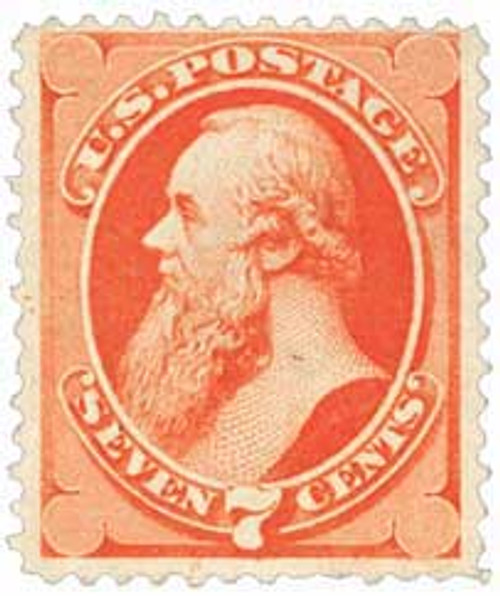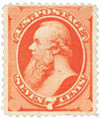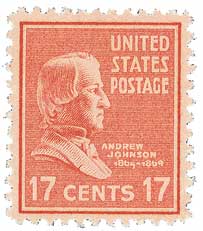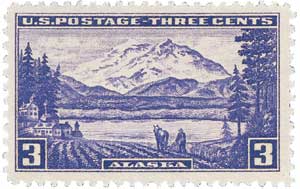
# 138 - 1871 7c Stanton, vermilion 'H Grill'
1870-71 7¢ Stanton
National Bank Note Printing
I or H Grill
Earliest Known Use: February 12, 1871
Quantity issued: 800,000 (estimate)
Printed by: National Bank Note Company
Method: Flat plate
Watermark: None
Perforation: 12
Color: Vermilion
Andrew Johnson Impeached
When Abraham Lincoln ran for re-election in 1864, his party felt he needed a Southerner to help repair the nation following the anticipated end of the Civil War. As a Southerner, a strong Unionist, and a leading member of the War Democrats, Andrew Johnson was an ideal candidate and they won by a landslide.
However, Johnson served as vice president for just six weeks before Abraham Lincoln was assassinated on April 14, 1865. In February of 1866, Congress passed an Extension of the Freedman’s Bureau, a federal refugee program that protected and gave shelter and other assistance to former slaves. It also held trials by military commissions of people accused of denying African Americans’ civil rights.
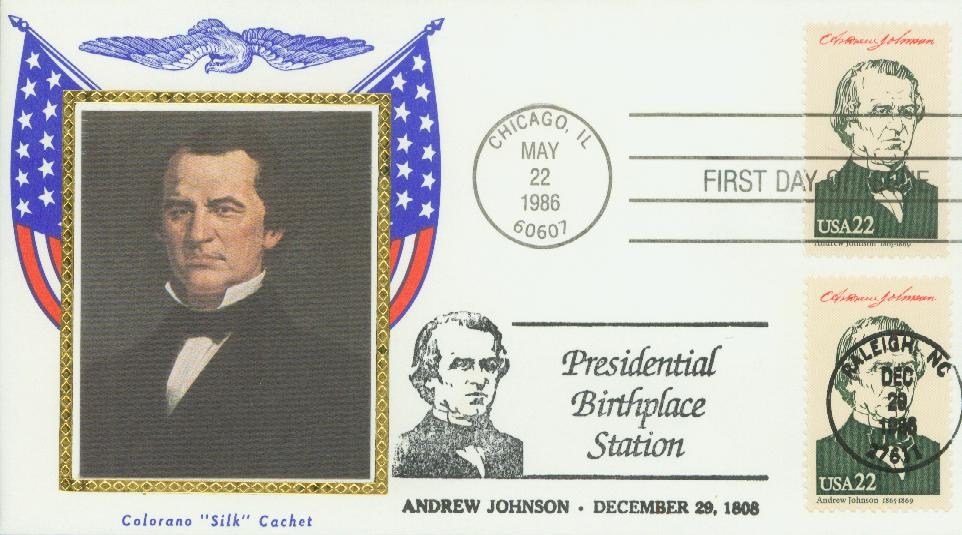
Surprising Congress, Johnson vetoed the bill and claimed it was race legislation. Five months later, Congress passed the bill over Johnson’s veto. Similarly, Johnson vetoed Congress’ Civil Rights Act of 1866, which declared all persons born in the United States (except Native Americans) as citizens, and granted them certain rights. Again, Johnson vetoed the bill, and again, Congress passed it anyway.
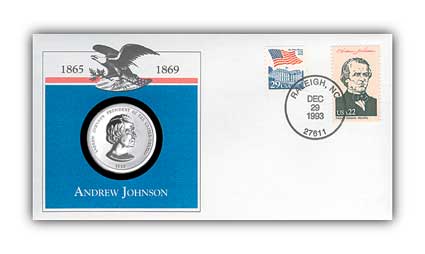
As the interim election of 1866 approached, Johnson had lost support within his party for his Reconstruction policies. With seemingly no one on his side, he embarked on a speaking tour, appealing to the public and searching for new political support. His plan backfired, and he was seen as crude in his attacks on his fellow politicians and Republicans. The anti-Johnson Republicans won two thirds of both houses, giving his opponents the power to completely override his programs.
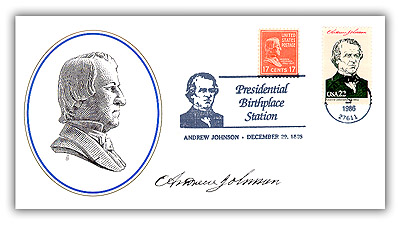
Congress passed new laws, requiring the Southern states to hold constitutional conventions with universal manhood suffrage. They had to establish their governments, ratify the 14th Amendment, and guarantee black male suffrage. Further, Congress passed laws to limit Johnson’s power, including the Tenure of Office Act, which declared the President could not remove certain federal officials without senatorial approval.
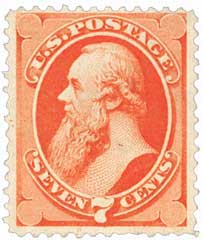
Offended by their extreme measures, Johnson challenged Congress by firing Secretary of War Edwin Stanton in August 1867, replacing him with General Ulysses S. Grant, who refused the position. When Congress returned in December, Johnson gave his reasons to the Senate, but they refused to accept it based on the new law.
The following February, Johnson fired Stanton again. Three days later, on February 28, 1868, the House voted to impeach the President by a vote of 126 to 47. With 11 charges against him, Johnson went on trial before the Senate on March 30. His lawyer argued that he was simply testing the constitutionality of the Tenure of Office Act. In May, the Senate held three votes, each one vote short of getting the two-thirds majority needed to convict. Click here to view an admission ticket to his impeachment trial.
Despite his continuing battles with Congress and the massive task of Reconstruction, Johnson’s term is more positively remembered for some of his foreign policy measures, and William Seward’s purchase of Alaska. After leaving the White House he became the only U.S. president to serve in the Senate following his term.
1870-71 7¢ Stanton
National Bank Note Printing
I or H Grill
Earliest Known Use: February 12, 1871
Quantity issued: 800,000 (estimate)
Printed by: National Bank Note Company
Method: Flat plate
Watermark: None
Perforation: 12
Color: Vermilion
Andrew Johnson Impeached
When Abraham Lincoln ran for re-election in 1864, his party felt he needed a Southerner to help repair the nation following the anticipated end of the Civil War. As a Southerner, a strong Unionist, and a leading member of the War Democrats, Andrew Johnson was an ideal candidate and they won by a landslide.
However, Johnson served as vice president for just six weeks before Abraham Lincoln was assassinated on April 14, 1865. In February of 1866, Congress passed an Extension of the Freedman’s Bureau, a federal refugee program that protected and gave shelter and other assistance to former slaves. It also held trials by military commissions of people accused of denying African Americans’ civil rights.

Surprising Congress, Johnson vetoed the bill and claimed it was race legislation. Five months later, Congress passed the bill over Johnson’s veto. Similarly, Johnson vetoed Congress’ Civil Rights Act of 1866, which declared all persons born in the United States (except Native Americans) as citizens, and granted them certain rights. Again, Johnson vetoed the bill, and again, Congress passed it anyway.

As the interim election of 1866 approached, Johnson had lost support within his party for his Reconstruction policies. With seemingly no one on his side, he embarked on a speaking tour, appealing to the public and searching for new political support. His plan backfired, and he was seen as crude in his attacks on his fellow politicians and Republicans. The anti-Johnson Republicans won two thirds of both houses, giving his opponents the power to completely override his programs.

Congress passed new laws, requiring the Southern states to hold constitutional conventions with universal manhood suffrage. They had to establish their governments, ratify the 14th Amendment, and guarantee black male suffrage. Further, Congress passed laws to limit Johnson’s power, including the Tenure of Office Act, which declared the President could not remove certain federal officials without senatorial approval.

Offended by their extreme measures, Johnson challenged Congress by firing Secretary of War Edwin Stanton in August 1867, replacing him with General Ulysses S. Grant, who refused the position. When Congress returned in December, Johnson gave his reasons to the Senate, but they refused to accept it based on the new law.
The following February, Johnson fired Stanton again. Three days later, on February 28, 1868, the House voted to impeach the President by a vote of 126 to 47. With 11 charges against him, Johnson went on trial before the Senate on March 30. His lawyer argued that he was simply testing the constitutionality of the Tenure of Office Act. In May, the Senate held three votes, each one vote short of getting the two-thirds majority needed to convict. Click here to view an admission ticket to his impeachment trial.
Despite his continuing battles with Congress and the massive task of Reconstruction, Johnson’s term is more positively remembered for some of his foreign policy measures, and William Seward’s purchase of Alaska. After leaving the White House he became the only U.S. president to serve in the Senate following his term.

